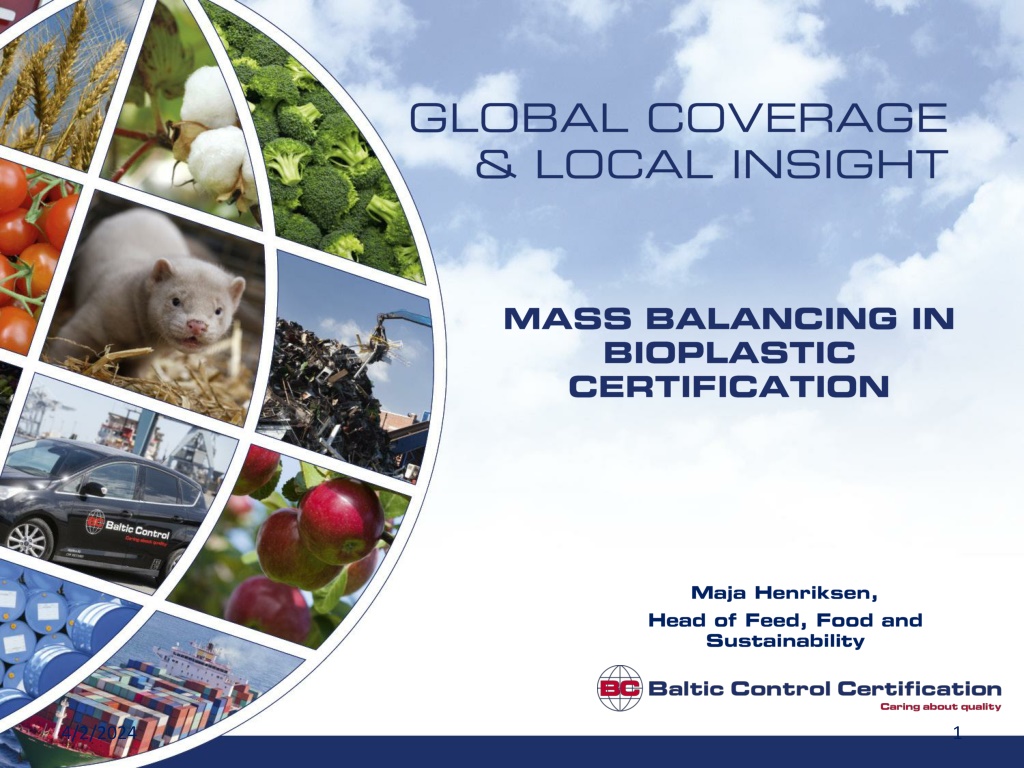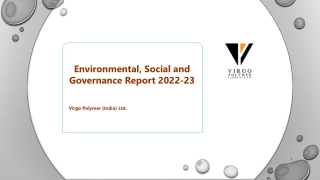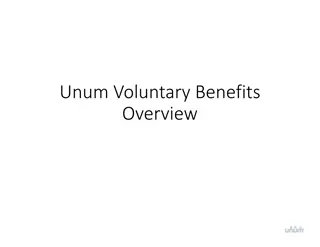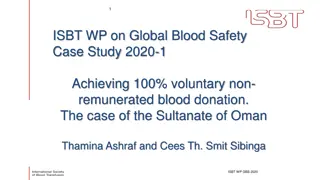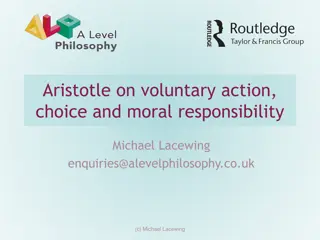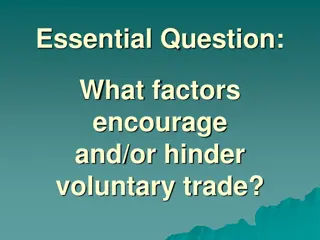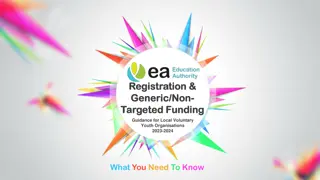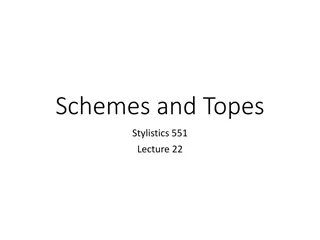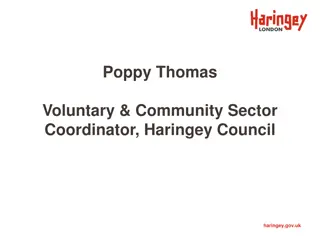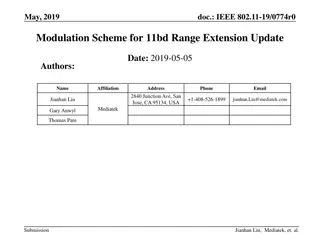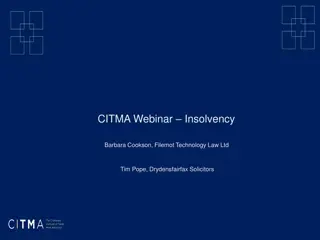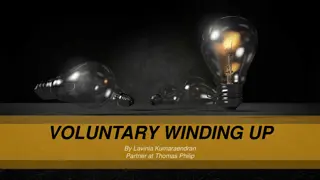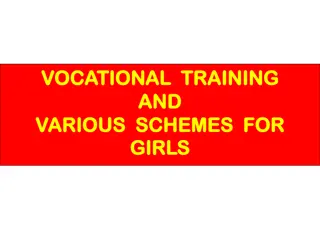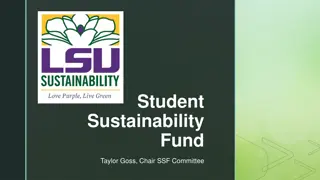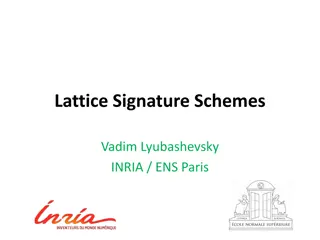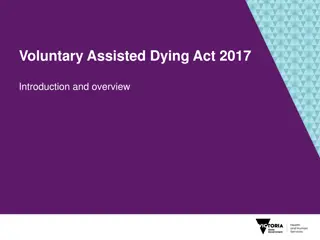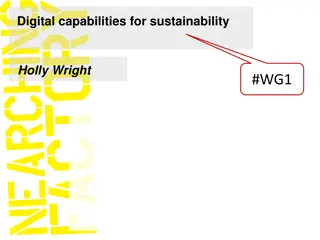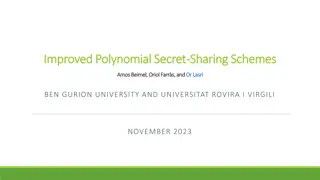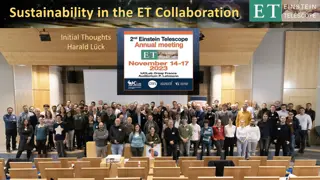Understanding Voluntary Sustainability Schemes: ISCC and REDcert
Explore the principles and methods of Voluntary Sustainability Schemes (VS) such as ISCC and REDcert, focusing on mass balancing to implement and document sustainability measures. Learn how these methods can support sustainability claims and bio-content initiatives. Gain insights from Maja Henriksen, Head of Feed, Food, and Sustainability at Baltic Control Certification A/S, on certification elements, chain of custody options, logos, and key takeaways related to sustainability in the context of REDII compliance and the EU policy framework on biobased plastics. Dive into the importance of meeting EU sustainability criteria for biomass used in biobased plastics production and how RED III Voluntary Schemes facilitate compliance with sustainability standards.
Download Presentation

Please find below an Image/Link to download the presentation.
The content on the website is provided AS IS for your information and personal use only. It may not be sold, licensed, or shared on other websites without obtaining consent from the author. Download presentation by click this link. If you encounter any issues during the download, it is possible that the publisher has removed the file from their server.
E N D
Presentation Transcript
4/2/2024 1
a. Give an introduction to the Voluntary Schemes (VS) ISCC and REDcert b. Explain the principles and methods the VS provide to implement and document sustainability measures, with focus on mass balancing c. Give examples on how these methods can create a basis for related claims on sustainability/bio-content 4/2/2024 2 Maja Henriksen, Head of Feed, Food and Sustainability, Baltic Control Certification A/S
1) Baltic Control Certification A/S 2) Legal framework Renewable Energy Directive and Voluntary Schemes 3) Elements of certification and required documentation 4) Chain of Custody options: Mass balance and physical segregation 5) Logos and Claims 6) Key points to take home 4/2/2024 3 Maja Henriksen, Head of Feed, Food and Sustainability, Baltic Control Certification A/S
Head of BCC Feed, Food & Sustainability Department Scheme Manager for ISCC and REDcert since 2020 Auditor for ISCC and REDcert since 2019 Background in Natural Resources and Nature Management from Copenhagen Univeristy 4/2/2024 4 Maja Henriksen, Head of Feed, Food and Sustainability, Baltic Control Certification A/S
From Communication EU policy framework on biobased, biodegradable and compostable plastics, 30 November 20222: Biomass used to produce biobased plastics must meet the EU sustainability criteria for bioenergy. As proposed by the Commission under the review of the Renewable Energy Directive (REDIII) of July 2021, these criteria include measures related to forest biomass and to biofuels with high risk of direct and indirect land- use change, such as those derived from palm oil. Pending finalization of REDIII negotiations, the REDII sustainability criteria for bioenergy should be applied. This is also the approach taken in the EU Taxonomy for sustainable investments for "agricultural biomass used for the manufacture of plastics in its primary form . 4/2/2024 5 Maja Henriksen, Head of Feed, Food and Sustainability, Baltic Control Certification A/S
RED III Voluntary Schemes = means to demonstrate compliance with sustainability criteria according to REDII, verified by 3. party legit sustainability claims! 4/2/2024 6 Maja Henriksen, Head of Feed, Food and Sustainability, Baltic Control Certification A/S
Short presentation of the elements of certification, the supply chain and required documentation 4/2/2024 7 Maja Henriksen, Head of Feed, Food and Sustainability, Baltic Control Certification A/S
Management system Traceability Voluntary add- on: Mass balance GHG Emissions 4/2/2024 8 Maja Henriksen, Head of Feed, Food and Sustainability, Baltic Control Certification A/S
Raw material category (bio, bio-circular, circular, renewable) The scope of certification of raw materials (the relevant declaration(s) shall be used for agriculture and waste/residues, respectively) Chain of Custody option (mass balance/physical separation) Country of origin (voluntary) Raw material (voluntary) GHG emissions (when choosing GHG add-on) 4/2/2024 Maja Henriksen, Head of Feed, Food and Sustainability, Baltic Control Certification A/S 9
The raw material complies with the relevant sustainability criteria according to Art. 29 (3)- (7) RED II Bio materials And/or The raw material meets the definition of waste or residue according to the RED II Bio-circular materials 4/2/2024 Maja Henriksen, Head of Feed, Food and Sustainability, Baltic Control Certification A/S 10
Contracts Correct classification of material (through sample audits, permits, websites, etc.) Plausibility of amounts Certified suppliers of raw material Internal audit/approval process of suppliers of sustainable material Approval of incoming documentation for sustainable material Invoices Delivery notes such as bill of lading, CRM document, etc. 4/2/2024 Maja Henriksen, Head of Feed, Food and Sustainability, Baltic Control Certification A/S 11
Processing Product Storage Sustainable and non- sustainable material Non- certified are mixed physically Sustainable product Certified Non-sustainable product 4/2/2024 Maja Henriksen, Head of Feed, Food and Sustainability, Baltic Control Certification A/S 12
13 4/2/2024 Maja Henriksen, Head of Feed, Food and Sustainability, Baltic Control Certification A/S
From Communication EU policy framework on biobased, biodegradable and compostable plastics, 30 November 20222: It is also important to ensure that biobased content is measured precisely. Radiocarbon based methods should be preferred as their results are robust and their use is widely accepted. Documenting the use of biomass through a chain of custody and attributing a share to end-products through mass balance accounting is a method which is not considered suitable for confirming the actual share of biobased content. Such method should be used only when it ensures a high level of transparency and accountability and is underpinned by agreed standards to avoid greenwashing . 14 4/2/2024 Maja Henriksen, Head of Feed, Food and Sustainability, Baltic Control Certification A/S
The standard version can be used without an additional claim if: 1) the product or packaging is made with at least 90% ISCC certified mass balanced material and 2) it is clear which part of the product or packaging is ISCC certified (e.g. chocolate cookies in ISCC certified recycled packaging) If a company sources less than 90% certified mass balanced material, it is only allowed to use this version if there is an additional statement on the proportion of certified material, e.g. 50% certified plastic (mass balance approach) . 4/2/2024 Maja Henriksen, Head of Feed, Food and Sustainability, Baltic Control Certification A/S 15
1) Voluntary Schemes provides specific tools for management and documentation of sustainability according to EU Renewable Energy Directive 2) Different Chain of custody options (mass balance and physical segregation) for quantifying sustainable/bio-content 3) The Chain of custody option and/or mass balance option determines the related, legitimate logos and claims to be used 4/2/2024 Maja Henriksen, Head of Feed, Food and Sustainability, Baltic Control Certification A/S 16
4/2/2024 Maja Henriksen, Head of Feed, Food and Sustainability, Baltic Control Certification A/S 17
